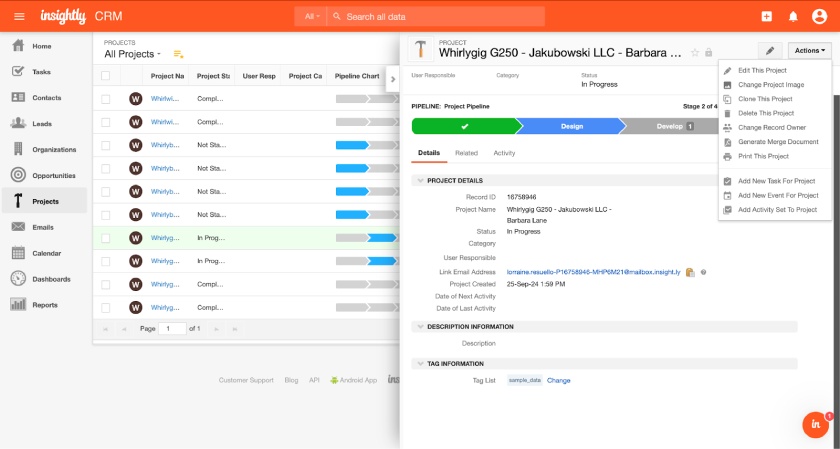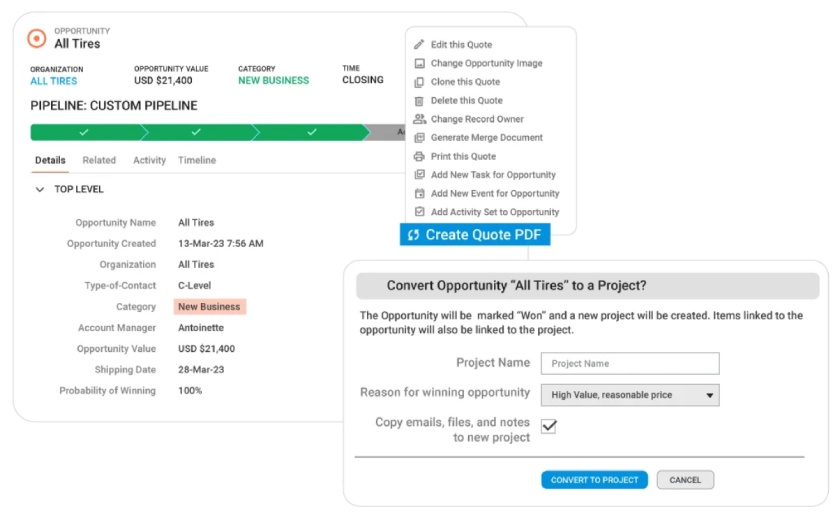Customer relationship management (CRM) systems have robust and advanced features, like automation, analytics, and integrations, and can handle enormous amounts of data. Given these qualities, most CRM products have a learning curve and can be overwhelming for new users.
The best simple CRMs have clean interfaces, straightforward navigation menus, and intuitive features that can help teams analyze relevant data at a glance for hassle-free small business sales operations.
After comprehensively reviewing and testing dozens of CRM systems, we came up with the 10 best simple CRM systems to help you make a more informed buying decision.
- HubSpot CRM: Best free all-in-one CRM
- Pipedrive: Best for basic sales automation
- monday CRM: Best for an intuitive CRM interface
- Zoho CRM: Best for basic customization tools
- Capsule CRM: Best for writing artificial intelligence (AI) sales emails
- Less Annoying CRM: Best for simplified user experience
- Insightly CRM: Best for built-in project and task management
- EngageBay: Best for multichannel engagement campaigns
- Copper CRM: Best for contact profile enrichment
- Streak CRM: Best for Google Workspace integration
Take your business to the next level with HubSpot: an all-in-one CRM featuring an intuitive interface, powerful features, and unmatched scalability. |

|
Featured Partners
Best Simple CRM Systems Compared
Provider | Free Plan | Free Trial | Our Rating out of 5 | |
|---|---|---|---|---|
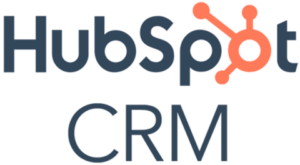 | ✓ 2 users | ✕ Free demo | $15 | 4.66 |
 | ✕ | ✓ 14 days | $14 | 4.65 |
 | ✕ | ✓ 14 days |
| 4.63 |
 | ✓ 3 users | ✓ 15 days | $14 | 4.60 |
 | ✓ 2 users | ✓ 14 days | $18 | 4.58 |
✕ | ✓ 30 days | $15 | 4.54 | |
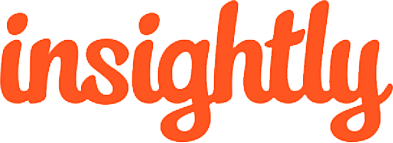 | ✕ | ✓ 14 days | $29 | 4.53 |
✓ 15 users | ✓ 14 days | $13.79 | 4.45 | |
✕ | ✓ 14 days | $9 | 4.44 | |
 | ✓ 1 user | ✓ 14 days | $49 | 4.15 |
Which simple CRM system is best for you?
HubSpot CRM: Best Overall Free All-in-One CRM
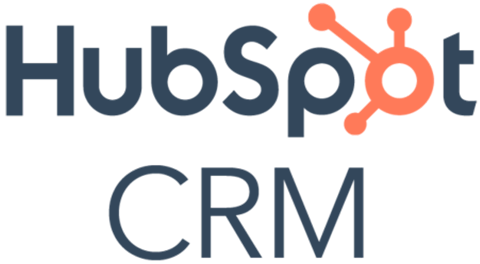
Pros
- The two-user free plan has many all-in-one CRM features with sales, marketing, service, content, and operations tools.
- Many email automation features are free without coding required.
- The interface design has a simple layout with quick navigation for a great user experience.
Cons
- It has a huge price jump from $15 per user (for the Starter plan) to $1,170 for five users monthly (for the Professional plan).
- It has fewer deal pipelines at a relatively higher price than other providers on the list.
- Account-based management (ABM) tools are locked in the Professional plan at $1,170 for five users.
- You’re a startup or small team looking for a free all-in-one CRM: HubSpot is free for two users. Users can bundle products with HubSpot CRM, including sales, marketing, content, operations, and service features.
The features include email campaigns, ads, list segmentation, deal and contact management, and live chat. This CRM system also has easy-to-use prospecting tools, which help identify leads visiting your website.
- You want to put marketing campaigns on autopilot: One of the top easy CRM software tools for HubSpot CRM is the email automation features. Many of the email features are free, and the automation uses a no-code format. This lets users at all skill levels deploy mass emails that automatically send or resend depending on contact segments or engagement activity like opens and clicks.
- You need scalable paid plans: HubSpot CRM’s Starter plan is affordable at $15 per user monthly. However, as you upgrade your plan, the pricing increases even with five users included, starting at Professional for $1,170 monthly. If you have a startup or small business, having a tight budget can restrict you from accessing more advanced features like lead scoring for ABM.
- Alternative: Zoho CRM offers easy-to-use CRM features in its free plan and cost-friendly paid plans that start at $14 per user for its Standard plan. This plan includes lead scoring and custom email templates for ABM. On the other hand, Pipedrive offers affordable and scalable paid plans. Its basic plan, Essential, comes with lead, calendar, and pipeline management features at $14 per user.
- You need multiple pipelines at a lower cost to sell multiple product lines: HubSpot CRM’s free plan allows you to manage only one deal pipeline, while its Starter plan limits you to two. The Professional plan costs $1,170 per month for 15 unique pipelines per account, which can be relatively pricey for startups.
- Alternatives: Zoho CRM allows sales teams to create five pipelines on its Standard plan for only $14 per user monthly, and then 10, 20, and 50 pipelines, respectively, on the Professional at $23, Enterprise at $40, and Ultimate plans at $52 per user, per month. EngageBay’s paid plans allow you to manage multiple deal pipelines, starting at $13.79 per user monthly.
HubSpot Pricing Plans*
*Pricing is based on annual billing on a per-user monthly breakdown of the HubSpot Customer Platform. Monthly billing and Enterprise plans are also available for a higher cost. We update pricing information regularly but encourage readers to check current pricing.
**The Customer Platform includes sales, marketing, customer service, a content management system (CMS), and operations software. Individual modules can be purchased for lower monthly costs.
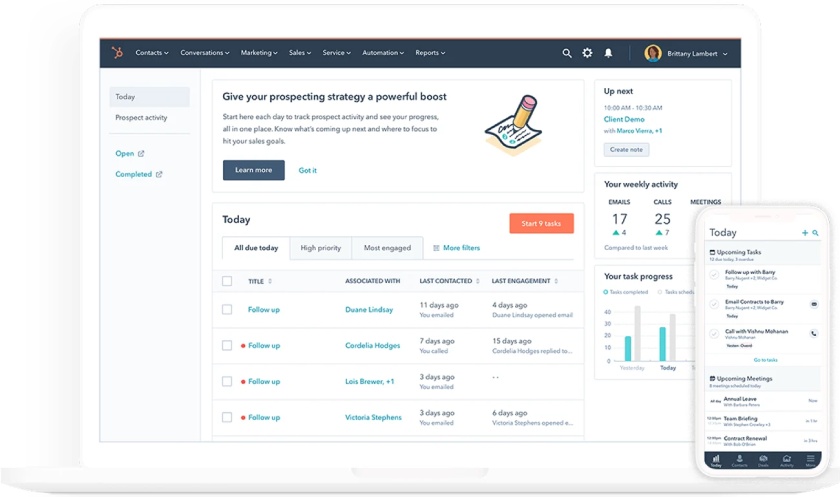
The HubSpot CRM dashboard shows tasks and activities on web and mobile views for all-around sales, marketing, and customer service operations. (Source: HubSpot)
Our Expert Opinion
HubSpot CRM is the best CRM with free all-in-one features and an easy-to-access customer database, making it one of the best CRMs for small businesses. It has robust tools for marketing, sales, service, commerce, and operations. The free plan includes easy-to-use activity and pipeline tracking and prospect tools for monitoring leads, making it the simplest CRM. Plus, choose other products and add-ons and bundle them to create a powerful yet easy-to-use CRM.
Pipedrive: Best Simple CRM for Basic Sales Automation

Pros
- It has easy automation tools like Sales Assistant and Smart Contact Data to save time on lead nurturing and sales activities.
- It has solid third-party integrations, such as Microsoft Outlook and Slack.
- It has 24/7 multilingual live chat and email support.
Cons
- It has no free plan, only a 14-day free trial.
- Phone support only starts in the Power plan at $64 per user monthly.
- Lead generation and web tracking tools cost extra, starting at $32.50 per company monthly.
- You need robust yet easy-to-use sales automation tools: Pipedrive is one of our top recommended sales automation software for automatically assigning sales tasks, updating CRM records, and more. Its smart Sales Assistant tool analyzes CRM data for lead prioritization and performance monitoring. Its Smart Contact Data feature also crawls the web for valuable data to help supercharge lead-generation efforts.
- You use Microsoft Outlook and Slack: Pipedrive is among our best choices for CRMs that integrate with Outlook. It has a two-way integration for email, contacts, and calendar with Outlook, keeping data consistent between the two systems. This easy CRM software is also one of the best CRMs that integrate with Slack. The Dealbot feature notifies users via Slack whenever there are updates or changes to deals.
- You want a free CRM: While Pipedrive offers affordable paid plans with a 14-day free trial, it does not offer a free plan. Hence, if you’re a freelancer or a startup looking to explore a CRM system at no cost, consider looking elsewhere.
- Alternative: HubSpot CRM is free and easy to use for beginners and small businesses. This CRM solution has robust features in its free plans that include deal management, marketing tools, and built-in calling, as well as a Kanban view for records. Other providers that offer freemium plans and scalable paid plan options include Zoho CRM and EngageBay.
- You need a basic CRM with affordable phone support: Pipedrive’s phone support for technical inquiries and other concerns starts in its Power plan at $64 per user monthly. Lower tiers have 24/7 chatbot support (starting with the Essential plan at $14 per user) and live chat support (starting at the Advanced plan for $34) during business hours. Some users find not being able to talk to a human person a huge drawback.
- Alternative: Less Annoying CRM offers phone support Monday through Friday during business hours. Similarly, EngageBay provides scheduled phone support during weekdays. And monday CRM offers 24/7 customer support from its customer success team and callbacks for billing inquiries.
Pipedrive Pricing Plans*
Pipedrive Add-ons:
- Projects Project management tools, free with Power and Enterprise plans : Starts at $6.70 per user monthly
- Campaigns Customizable email campaigns : Starts at $13.33 per company monthly
- LeadBooster Lead generation tool set (chatbot, live chat, prospector, web forms, and appointment scheduler) : Starts at $32.50 per company monthly
- Smart Docs Trackable quotes, proposals, and contracts; free with Professional, Power, and Enterprise plans : Starts at $32.50 per company monthly
- Web Visitors Web tracking and lead ranking : Starts at $41 per company monthly
*Pricing is based on annual billing on a per-month breakdown. Monthly billing is available for a higher cost. While we update pricing information regularly, we encourage our readers to check current pricing.
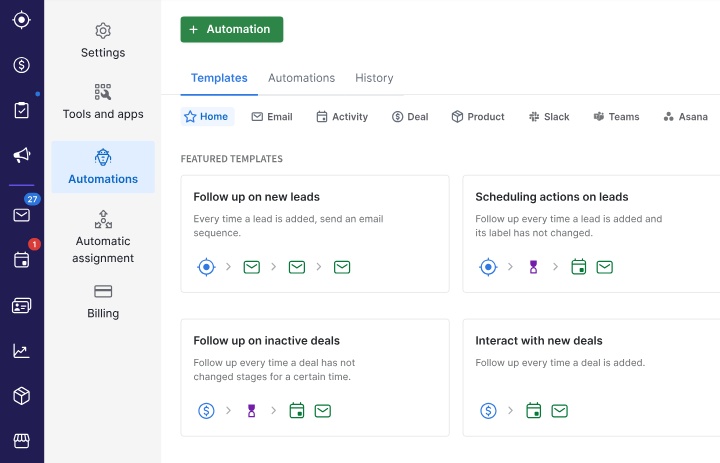
Pipedrive sales automation includes featured email templates to follow up with leads easily.
(Source: Pipedrive)
Our Expert Opinion
Pipedrive provides powerful yet easy-to-use automation tools like an automation builder and Smart Contact Data for data management, profile enrichment, and even sales proposal generation. Additionally, Pipedrive makes it easier to understand CRM data through its visualization tools. This platform also offers in-app calling and seamless integration with more than 300 services and tools from its app marketplace, including Microsoft Outlook and Slack.
monday CRM: Best Easy CRM With an Intuitive Interface

Pros
- It’s intuitive for setting up automations to create or edit records based on preset triggers.
- It has multiple viewing options with a spreadsheet-style format for storing data and customizing boards for data fields.
- It offers unlimited contacts, documents, and boards.
Cons
- Lead scoring requires the Enterprise plan at a customized cost.
- Pricing is misleading; all plans require three minimum users.
- It lacks integration to manage ad campaigns from the CRM.
- You need a simple and intuitive customer database: monday CRM makes it easy to organize and manage customer data with its neatly arranged folders for each aspect of your sales process. This easy CRM for small businesses has a highly intuitive interface, which makes it very easy to learn, navigate, use, and customize.
You can also use its CRM templates to manage contacts, leads, and workflows, which makes it one of the best customer database software.
- You want multiple viewing options for your data: Another great aspect of monday CRM is the various board viewing options to evaluate your database. Depending on your objective, such as checking sales pipeline progress, tracking task due dates, or identifying customers’ locations, you can look at their data in Kanban, timeline, calendar, map, chart, or workload views.
- You need more affordable lead scoring: While monday CRM offers lead scoring to help you qualify leads and prioritize sales opportunities, you need to avail of the Enterprise plan, which requires a custom quote.
- Alternative: Zoho CRM lets you score leads to prioritize those with a higher likelihood to convert. This feature is available on its most basic plan, Standard, for only $14 per user monthly.
- You need a CRM with more transparent pricing and no minimum user requirement: monday CRM plans require a three-user minimum requirement, so expect to pay at least $36 per month at $12 per user. This can be a big disadvantage for solopreneurs and freelancers.
- Alternatives: HubSpot CRM is an excellent alternative to monday CRM. It comes with free plans and no minimum user requirement. EngageBay and Capsule CRM have free and scalable plans with clear pricing on a per-user basis.
monday CRM Pricing Plans*
*Pricing is based on annual billing on a monthly breakdown. Monthly billing is available for a higher cost. While we update pricing information regularly, we encourage our readers to check current pricing.
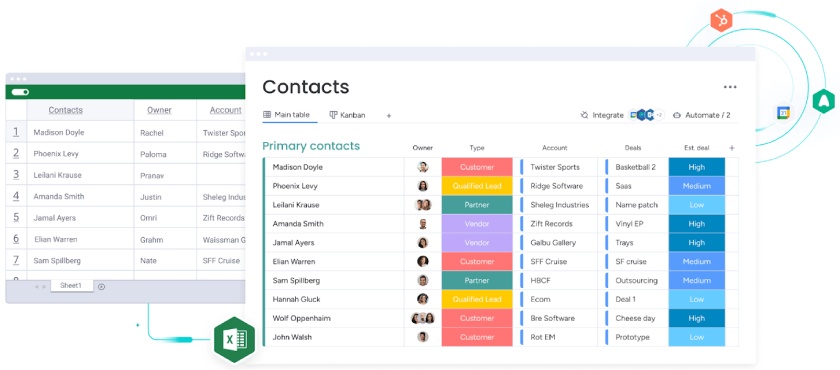
monday CRM’s contact management system features an intuitive interface for ease of use. (Source: monday CRM)
Our Expert Opinion
If you’re looking for one of the simplest CRM systems for small businesses, monday CRM is our top pick. It has a minimal to no learning curve, greatly benefiting new CRM users. We love its spreadsheet-style format that makes data storage and board customization quick and easy. Plus, its multiple data viewing options promote greater data visibility and seamless data management.
Zoho CRM: Best for Basic CRM Customization Tools

Pros
- It offers a free plan for three users and a range of affordable pricing options (starting at $14 per user) with customization features.
- It easily integrates with social media profiles and Zoho’s ecosystem of business tools.
- It has AI capabilities for data enrichment, sales forecasting, etc. at the Enterprise plan for $40 per user monthly.
Cons
- Phone features are not available in the free plan; must subscribe to the Standard plan at $14 per user monthly.
- It has limited file storage allocation in most plans (1GB); only the Ultimate plan ($52 per user monthly) offers a 5GB storage allocation.
- Basic customer support is limited to email support, a self-service portal, community forums, and a knowledge base.
- You need a CRM solution with thorough database customization: Zoho CRM is one of the best customizable CRMs. If you’re looking to customize your CRM based on your branding and work preferences, you can change the homepage’s visual elements. For instance, you can modify the list views and data fields, rename the tabs, change search layouts, and even build custom modules—all in its free plan.
- You’re looking for a solid social CRM: Zoho CRM integrates with Facebook, X (formerly Twitter), and LinkedIn. If you want to frequently interact with your followers and engage directly with customers via comments and messages, Zoho CRM is an excellent choice. With direct integration with Zoho’s business tools, like Zoho Desk and Zoho Campaigns, you benefit from more efficient business operations.
- You’re looking for a sales-focused CRM: Zoho CRM is an all-in-one platform with plans that include comprehensive tools for sales, marketing, and customer service. It’s less ideal if you only need tools for sales processes.
- Alternative: Pipedrive offers specialized tools for sales. These include time-saving workflows, visual sales pipelines, and deal management.
- You want a CRM with free telephone and email features: Zoho CRM’s free-forever plan does not include native telephone and email management tools. Zoho PhoneBridge starts in the Standard plan (at $14 per user monthly). This integration makes calls part of your sales process, which is available on a private branch exchange (PBX) for inbound and outbound calls, voicemail, and call forwarding.
- Alternative: HubSpot CRM offers a free plan that lets you integrate Aircall and other voice-over-internet-protocol (VoIP) providers without plugins or extensions. This simple CRM for small businesses also has a built-in phone system, email integrations, and meeting scheduling capabilities, which help with prospect engagement and overall customer service.
Zoho CRM Pricing Plans*
Zoho CRM Add-ons:
- Additional File Storage: $4 per month for 5GB (paid plans only)
- Additional Data Storage (up to 200 users): $4 for 100MB per month (for Professional and up)
- Additional Data Storage (200-plus users): $2 for 100MB per month (for Professional and up)
- Data Backup: $12 per request
*Pricing is based on annual billing on a per-month breakdown of the plans. Monthly billing is available for a higher cost. While we update pricing information regularly, we encourage our readers to check current pricing.
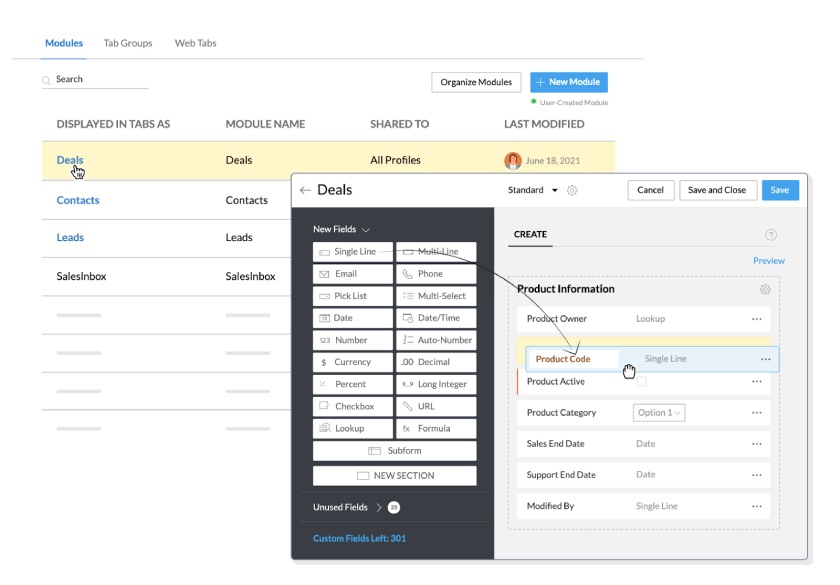
Zoho CRM lets you customize data with the fields you need for seamless records management. (Source: Zoho CRM)
Our Expert Opinion
Zoho CRM is the best CRM for small businesses when it comes to offering complete customization and automation tools with its free and lower-priced plans. It is an excellent solution if you want to tailor your CRM to your unique operations. That said, its rich feature set requires a slight learning curve, but its highly intuitive interface is easy to use once you become familiar with the system. We highly recommend this best simple CRM software for growing small businesses.
Capsule CRM: Best for Writing AI Sales Emails

Pros
- The free plan includes an AI content assistant that helps craft and optimize sales emails.
- It has built-in project and task management tools like Kanban-style project boards and task tracking.
- It offers an email marketing campaign designer with templates, drip automation, dynamic content, and campaign analytics.
Cons
- The Free plan is limited to 250 contacts, basic dashboards, and email tools.
- Customer support is limited to email ticketing.
- It lacks ecommerce features, like inventory management, a website designer, and purchase order processing.
- You want to use AI assistance to write sales emails: Capsule CRM’s best feature is its AI content assistant tool, which helps you generate quality email drafts from within contact records. It also gives you recommendations on the content, length, and tone of your message. AI assistance is available in free and paid plans.
- You run a project-based business: Capsule CRM offers Kanban-style boards and “Tracks” across all its plans, standardizing the project delivery and sales process. If you have a project-based business like a construction firm, Capsule CRM is a great option. You can easily track project timelines, conduct onboarding processes, and monitor customer activities, support requests, and client deliverables.
- You want a CRM that offers email tracking tools: Capsule CRM offers basic email marketing features with templates, but it has no advanced features like tools for email tracking. Some marketing agencies and companies needing to implement email newsletter campaigns may find this as a significant drawback.
- Alternatives: HubSpot CRM tops our list of the best CRMs for email marketing, offering free mass email and performance tracking. EngageBay offers free email tracking tools and templates for 15 users, suitable for launching email outreach and marketing campaigns. Copper CRM offers email open tracking, automation, and bulk email on its Professional plan ($59 per user monthly).
- You need a CRM for managing your ecommerce business: You need ecommerce features for inventory and order management, an online store builder, etc. But Capsule CRM doesn’t offer these capabilities.
- Alternatives: Zoho CRM is one of our top recommended ecommerce CRMs for small businesses. It offers various tools for online businesses, such as inventory management, marketing, analytics, and customer support. HubSpot CRM and Pipedrive are excellent ecommerce CRMs, too, with easy-to-operate features.
Capsule CRM Pricing Plans*
Capsule CRM Add-on:
- Transpond (marketing automation tools): Starts at $11 per user monthly
*Pricing is based on annual billing on a monthly, per-user breakdown. Monthly billing is available for a higher cost. While we update pricing information regularly, we encourage our readers to check current pricing.
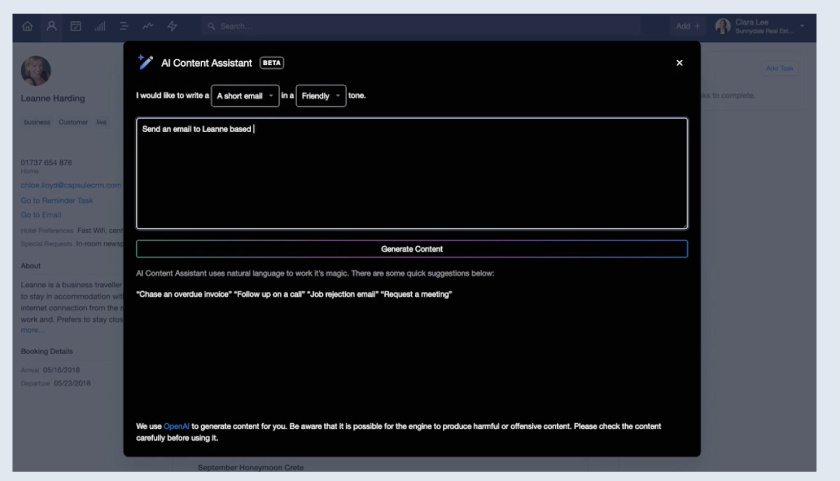
Capsule CRM’s AI content assistant can help reps create emails quickly and easily. (Source: Capsule CRM)
Our Expert Opinion
Capsule CRM is one of the best AI CRMs because of its free AI content assistant, which helps reps reduce manual work by autogenerating sales emails based on contact data. This simple CRM’s integrated project management features are one of its strongest selling points. The intuitive tools of the best simple CRM for small businesses allow sales reps to focus on selling while delivering on their promises, as well as streamlining sales and service operations in a single system.
Less Annoying CRM: Best for Simplified User Experience

Pros
- It has a simple user interface and intuitive features for contact, task, and sales management.
- Subscribers enjoy unlimited companies, contacts, custom data fields, sales pipelines, and permissions.
- All features are included in one low-cost pricing for straightforward billing with free upgrades and mobile access.
Cons
- It has limited integrations; mostly through an app connector like Zapier.
- It lacks advanced AI and analytics capabilities.
- It has no free plan, price variations, or annual billing option; 30-day free trial only.
- You need a simple CRM with all features included in one straightforward pricing: Less Annoying CRM offers no frills, highly recommended for solopreneurs and startups. It displays tasks and sales pipelines in a way that helps users quickly see where leads are and what the next best steps are. Moreover, Less Annoying CRM gives you access to all features, like a simple calendar for tracking tasks, at one price tier.
- You want a basic CRM with unlimited contacts and company records: Less Annoying CRM lets you store unlimited contacts, company records, custom fields, and sales pipelines. If you’re a solopreneur, this basic CRM makes data gathering more streamlined even without extra hands available. Scaling businesses like service-based companies can save money with a single-priced plan for unlimited users.
- You need robust native and third-party integrations: For small businesses needing a simple CRM but with several integration options, Less Annoying CRM falls short. This CRM can be directly integrated with Google Calendar, Outlook Calendar, and Xapp.ai (generative AI). However, it can’t connect with accounting, inventory, and other third-party apps without an app connector, like Zapier.
- Alternative: HubSpot CRM, Pipedrive, and Zoho CRM have hundreds of integrations with native and third-party apps for various business operations. These CRMs have a full-packed app marketplace, where you can find plenty of solutions to integrate with and power up your business system.
- You want access to AI tools for automating tasks: Less Annoying CRM lacks advanced AI features. This limits your ability to automate workflows and generate data insights quickly, which can affect a sales executive’s decision-making process.
- Alternatives: Pipedrive uses AI and automation tools like a chatbot, an email summarizer, and an AI sales assistant to help reps convert leads and retain buyers. On the other hand, HubSpot CRM has AI-driven tools that can help enhance productivity. These capabilities help reps manage menial tasks and sell quickly while ensuring better customer experiences.
Less Annoying CRM Pricing Plans*
Cost: $15 per user
Key Features:
- Unlimited contact and company records The provider doesn’t place any strict limits on the number of contacts and companies you can enter, but a good rule of thumb is to try to stay below 50,000 total.
- Unlimited custom fields
- Unlimited pipelines
- 25GB file storage
- Contact management with notes, files, tasks, and events tracking
- Lead monitoring, reporting, and prioritization
- Sales pipeline management
- Email logging
- User permissions
- Mobile access via a web browser
*Pricing is based on a monthly pay-as-you-go payment plan. Businesses with more than 10 users must get a custom quote. While we update pricing information regularly, we encourage our readers to check current pricing.
Less Annoying CRM’s workspace shows a simple user interface with common features reps can use to manage leads and sales.
(Source: Less Annoying CRM)
Our Expert Opinion
Less Annoying CRM wins for the simplest plan structure with user-friendly navigation. We love how users can easily view contacts, leads, pipelines, and statuses in a simple, modern interface. This easy CRM system has easy-to-see menu options, and all features are accessible with unlimited contacts and companies. Plus, its cost-effective plan includes all features at a relatively low price without surprise charges or add-on fees.
Insightly CRM: Best for Built-in Project & Task Management

Pros
- Built-in project management tools are included in the most basic plan, Plus, at $29 per user monthly.
- Users can easily customize email templates with the drag-and-drop functionality.
- Advanced capabilities like record-linking detect contact associations, lead routing for rep assignment, and quotes management.
Cons
- Add-on fees apply to customer service and marketing modules (starting at $29 per user monthly).
- It lacks social media features such as social profile enrichment.
- Product management capabilities are locked in the Enterprise plan ($99 per user monthly).
- You need project and task management features: Insightly CRM offers several project management and delivery capabilities to help you tackle tasks quickly. Sales reps can turn deals into projects for 360-degree visibility of customer requirements. It promotes seamless after-sale transitions and retains more loyal customers. With milestones and pipelines, you can improve cross-team communication to attain goals.
- You need an easy-to-use email builder: Engage with your prospects using Insightly CRM’s customizable email templates. Front-end developers can easily add buttons, media, buttons, content blocks, and icons by simply dragging and dropping the elements for a custom email layout. Business-to-business (B2B) companies focused on email marketing and lead-nurturing campaigns greatly benefit from this tool.
- You prefer a CRM with built-in customer service and marketing modules: Insightly CRM’s customer service and marketing modules are available as add-ons. Other providers offer support and marketing tools within their packages for cost-effectiveness or more structured CRM pricing.
- Alternatives: Our top recommendations for built-in marketing and service capabilities are HubSpot CRM and Zoho CRM, which offer these modules in their free plans. HubSpot CRM’s free marketing tools include an AI blog and marketing event objects to store and track campaigns. Zoho CRM offers marketing campaign automation in its freemium plan.
- You want to integrate your simple CRM with social media: While Insightly CRM has excellent project management features, it lacks social media capabilities for engagement, profile enrichment, and overall management. If you frequently use social media for marketing, outreach, and lead nurturing, you can choose a suitable alternative to this CRM.
- Alternatives: Zoho CRM lets you connect and engage with your prospects and customers on social media without leaving the platform. With monday CRM, you can manage your Facebook Ads campaigns from the platform.
Insightly CRM Pricing Plans*
Insightly CRM Add-ons:
*Pricing is based on annual billing on a per-month basis. Monthly billing is available for a higher cost. While we update pricing information regularly, we encourage our readers to check current pricing.
Our Expert Opinion
Insightly CRM has built-in project and task management tools at a relatively affordable price. We love how reps can convert opportunities into projects and become more efficient in handling projects and related pipeline activities throughout the day. We like how the email builder simplifies email template customization with its drag-and-drop functionality. We also find its relationship-linking, lead assignment, and quote management capabilities highly essential in sales operations.
EngageBay: Best for Multichannel Engagement Campaigns

Pros
- It has multichannel engagement tools like live chat, email, short message service (SMS), video messaging, and social media.
- The free plan has advanced campaign tools like lead scoring, social media monitoring, and live chat.
- Cost-scalable plans range from $13.79 to $110.39 per user monthly.
Cons
- Workflow automation and proposal management are not available until the Growth plan for $59.79 per user monthly.
- It only allows a relatively limited number of contact records in the Free and Basic plans; up to 500 contacts only.
- It has no free calling features; calling minutes start in the Basic plan at $13.79 per user monthly.
- You use an omnichannel approach for customer engagement: With EngageBay, you can interact with your leads and customers through email, live chat, social media, SMS, and video messaging, all from a single platform.
This basic CRM system also allows you to integrate your CRM with VoIP telephone systems like RingCentral and Twilio. With this capability, you can easily make and receive calls from leads and customers, ensuring you promptly respond to their inquiries efficiently and cost-effectively.
- You need free lead scoring features: EngageBay’s predictive lead scoring features are available even with its free plan. Scoring your leads improves conversion as you identify qualified leads that are closest to making a buying decision. Hence, having these features for free makes EngageBay a solid choice for lead generation on a budget.
- You’re seeking a CRM with low-cost proposal generation features: EngageBay’s proposal generation and management features are not available until the Growth plan, which costs $59.79 per user monthly.
- Alternative: Pipedrive’s Professional plan ($49 per user monthly) includes Smart Docs to centralize your entire documentation process. You can send trackable quotes, contracts, and proposals from within the CRM.
- You need free and affordable CRM options with more data capacity: EngageBay’s free tier has a 250-limit on contact storage. So it’s not ideal if you’re catering to contact data on a massive scale.
- Alternative: If you’re looking to build relationships with more than 250 leads and customers at no cost, try HubSpot CRM. Its free option allows you to store up to 1,000,000 contacts. Moreover, Streak CRM offers unlimited contact data capacity.
EngageBay Pricing Plans*
*Pricing is based on annual billing on a per-user, monthly breakdown of the EngageBay All-in-One plans. Monthly billing is available for a higher cost, and biannual billing is available for a lower cost. While we update pricing information regularly, we encourage our readers to check the current pricing.
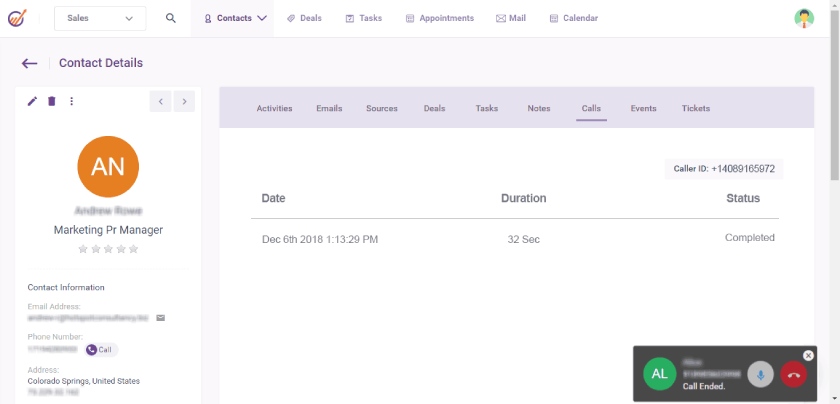
EngageBay CRM enables users to make calls directly with call recording for quality assurance and training purposes. (Source: EngageBay)
Our Expert Opinion
EngageBay’s greatest strengths include its multichannel campaign management feature and its Social Suite, which allows sales teams to engage with leads on social media. This is the best simple CRM system for solopreneurs because of its easy-to-navigate interface once you familiarize yourself with it. Moreover, this all-in-one platform is one of the best CRMs for freelancers looking to get the most value out of their subscriptions.
Copper CRM: Best Easy CRM for Contact Profile Enrichment

Pros
- Its relatively easy-to-use and low-cost contact management and data enrichment start at its Basic plan for only $23 per user monthly.
- Unique Google Chrome extension lets users view and access CRM data directly in Gmail or Calendar interfaces.
- It has similar interface to Google products and seamless integration with Gmail, Sheets, and Drive for a solid user experience.
Cons
- It has no free plan, only a 14-day free trial.
- Lead scoring is locked in the Business plan at $99 per user monthly.
- Non-Google integrations require the Professional plan at $59 per user.
- You need an easy-to-use and low-cost way to manage contact data: Copper CRM’s Basic Plan at $23 per user monthly lets users enrich contact data using publicly available information. This helps in lead generation and sales follow-ups. This simple CRM for small businesses supports Google users using Gmail, Drive, and Sheets.
- Your team uses Google apps for work collaboration: Copper CRM is considered the best Google CRM system because it is built specifically for Google Workspace app users as reflected by its similar design. It directly integrates with other Google products to expand data management functionality. This simple CRM tool also has a Chrome extension to modify CRM data records directly from within Gmail and Google Calendar.
- You need a free client database solution: Copper CRM, unfortunately, does not offer a free option for storing contacts and customer data.
- Alternative: One of the best free customer and client database systems is HubSpot CRM. Its free plan includes contact and company management tools, email templates, and Gmail, Outlook, and Microsoft Exchange integrations—all crucial in building a solid client database.
- You’re looking for low-priced lead scoring tools: Copper CRM’s lead scoring features for analyzing promising leads based on profiles and activity get expensive—starting at $99 per user monthly for the Business plan.
- Alternative: Zoho CRM offers a lead-scoring feature for only $14 per user monthly. Sales reps can score leads based on their interactions with your small business to determine their chances of conversion from prospects to paying customers.
Copper CRM Pricing Plans*
*Pricing is based on annual billing on a per-user monthly breakdown. Monthly billing is available for a higher cost. While we update pricing information regularly, we encourage our readers to check current pricing.
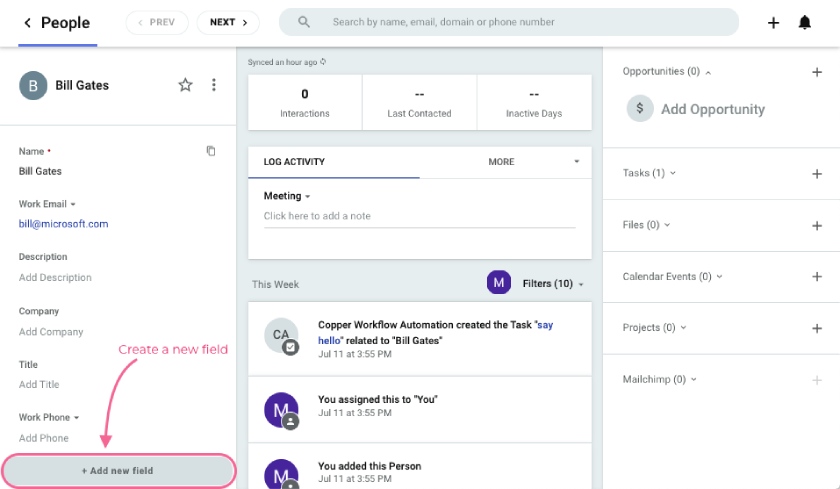
Copper CRM’s contact dashboard lets you create a custom field in a contact record for quick access and data organization. (Source: Copper CRM)
Our Expert Opinion
Copper CRM’s basic plan already comes with contact enrichment capability. The provider searches the internet to discover and record contact details, social profiles, and other publicly available information. In addition to the deep connections to Google apps, Copper is an all-around easy CRM to use in terms of operating the features and collaborating with others.
Streak CRM: Best for Google Workspace Integration

Pros
- It offers a Chrome extension that allows you to operate the CRM inside your Gmail inbox.
- The Free plan includes unlimited contact storage and mass email campaigns.
- Scalable paid plans range from $15 to $129 per user monthly.
Cons
- You will need the Pro+ plan at $69 per user to access workflow automation.
- Only one user can access the free plan.
- Third-party integration outside of Google apps charges extra.
- You want easy CRM software to use with Google Workspace: Streak CRM is one of our top Google CRMs because it integrates with Google Workspace and its major apps like Docs, Sheets, and Drive.
Plus, it connects seamlessly with Gmail, allowing you to access CRM data and tools from within your inbox. That way, you can monitor pipeline stages, records, and tasks without hopping between two platforms.
- You want unlimited contact data capacity: Even in its free plan, you can already store unlimited contacts and track associated data in the pipeline—a feature made exclusive to paid plans in other providers. On top of that, you can readily use this data to deploy mass email campaigns for prospects and leads in this basic CRM system.
- You want affordable workflow automations: Setting sales processes and CRM workflows on autopilot will require you to shell out $69 (Pro+ plan) when using Streak CRM. This price may appear too hefty for small businesses on a budget.
- You need a free plan for multiple users: While Streak CRM offers a free-forever plan, it is limited to only one user. If you’re a team looking for a gateway CRM, you may want to consider looking elsewhere. Moreover, Streak CRM’s free plan only has email tracking tools like email sharing, link tracking, snippets, and mail merge.
- Alternative: HubSpot CRM provides access to two users in its free plan. This CRM is ideal for solopreneurs or a small business handled by one to two members. If you have more than 10 users, go for EngageBay. It provides free-forever tools for teams of up to 15 members.
Streak CRM Pricing Plans*
*Pricing is based on annual billing on a monthly breakdown. Monthly billing is also available for a higher cost. We update pricing information regularly, but we encourage readers to check current pricing.
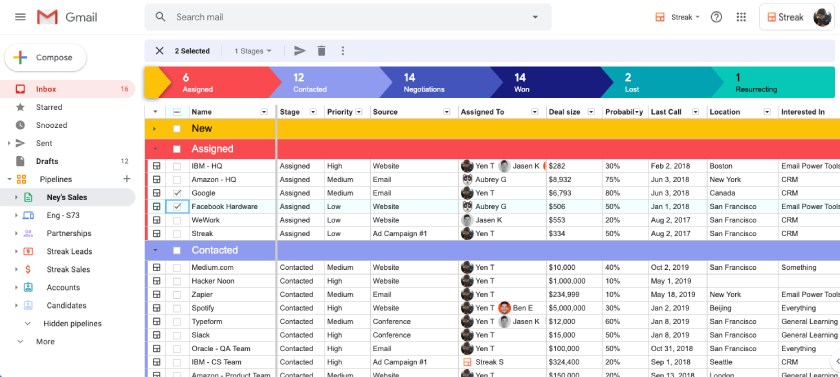
Streak CRM tools, like pipeline management, can be accessed in Gmail inbox for efficient lead outreaching, prospecting, and nurturing. (Source: Streak)
Our Expert Opinion
Streak CRM redefines CRM simplicity by leveraging people’s familiarity with Google Workspace. By integrating the core CRM features into the Gmail inbox, you save yourself the extra time to master a new interface in one go. On top of that, you can centralize collaboration, tasks and pipeline monitoring, lead tracking activities, and mass emailing efforts in one space using this simple CRM tool.
How We Evaluated the Best Simple CRM
When choosing the best CRM, we narrowed our list to simple CRM systems for small businesses to those with an intuitive interface and a minimal learning curve to operate. These basic products offer a clean layout, modern color schemes, simple button placement for easy navigation, and a solid user experience.
Additionally, we looked at other essential product attributes, such as features, pricing, and customer support availability of simple CRMs. Review our evaluation process for choosing the best simple CRM for small businesses.
20% of Overall Score
Pricing was a top criterion in our evaluation, apart from ease of use when we evaluated easy CRM systems. We considered free plan availability and various scalable pricing options businesses could afford as they grow. We also looked at any option that allows a subscriber to either pay monthly or save by paying annually.
30% of Overall Score
We looked at the overall features crucial to any basic CRM software, regardless of its primary use case or usability ratings. We wanted to see if each product had tools essential to any sales operation. It should have customizable pipelines, reporting and analytics tools, and an extensive range of third-party and native integration options. We also considered the lead management tools and mobile app capabilities.
20% of Overall Score
When we evaluated the best simple CRM systems, we used this metric to describe how users can easily navigate and operate the features, such as contact management and automation tools. We assessed the ease of use of the above simple CRM software programs considering the built-in templates, onboarding or learning curve, ease of setup, and scalability.
15% of Overall Score
Though each product is assumed to be easy to operate, extensive support and service are still necessary to help prevent poor experiences. This category was evaluated in terms of customer service hours and the availability of support via phone, live chat, and email. We also looked at self-service and help center resources users can access, like tutorials, forums, or training modules in simple CRM systems.
15% of Overall Score
In addition to first-hand experience with these intuitive CRM systems, we evaluated what actual users say about each product according to online reviews. These criteria consider how customers feel about product ease of use. It also provides insights into customer feelings regarding value for the price paid and how useful they find the CRM’s features.
Frequently Asked Questions (FAQs)
The easiest CRM to use depends on the user’s experience and preference. For example, we rated HubSpot CRM as the easiest system to use for its all-in-one functionality, but you might prioritize other usability aspects like sales automation. In this case, you should check out Pipedrive instead.
A CRM for beginners is intuitive, with a straightforward layout and navigation and a minimal learning curve when operating for the first time. Your best options for beginner-friendly CRMs include all the providers mentioned above. However, you may lean more toward HubSpot CRM for a more general experience in operating a holistic CRM, or Streak CRM if you want a CRM integrated with Google Workspace.
Less Annoying CRM is one of the best CRM systems for solo users. It includes all the features the provider can offer in an affordable one-priced plan. The free-forever tools from HubSpot CRM, Zoho CRM, Capsule CRM, EngageBay, and Streak are also great options for single users. These CRM systems can save you money while giving you the freedom to use and maximize basic CRM functionalities for your startup or solo-managed small business.
Using an easy CRM is highly beneficial if you’re starting a business or a small business owner wanting to efficiently manage your sales, customer service, and marketing operations with just one tool. A user-friendly interface with Kanban-style boards and intuitive features can save time and effort and help you focus more on your business.
Bottom Line
Simple CRM software is uniquely built, so users at any technical level can navigate the interface and operate the features easily. These products have minimal button menu options, clean layouts, and calming color schemes that don’t overwhelm users and impact their experience. While HubSpot CRM is our pick for the simplest CRM for small businesses, other products like Pipedrive and Zoho CRM could be a better fit depending on feature preferences and ease of use.



